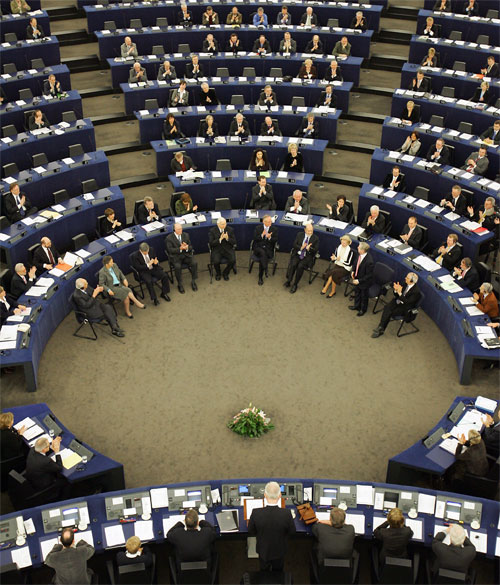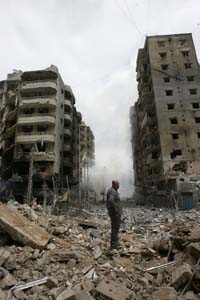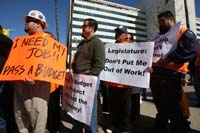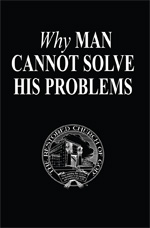 Frederick Florin/AFP/Getty Images
Frederick Florin/AFP/Getty Images
Article
As the world teeters on the brink of financial disaster, leaders are calling for a new world order. Why?
Learn the why behind the headlines.
Subscribe to the Real Truth for FREE news and analysis.
Subscribe NowThe current financial collapse has the West hearing phrases not heard before: “exploding deficits” and “devastating inflation,” with the situation possibly getting “worse than the Great Depression.” In the end, the “magnitude of the debacle” may cause the situation to “fragment disastrously” on a global level.
Perhaps the most profound statement heard is that “nations will be redefined and their futures fundamentally altered,” uttered by Rupert Murdoch.
As one commentator put it, “We are all in trouble.”
These are sobering times. Uncertainty grips every level of Western civilization.
Families are uncertain whether they will keep their homes. Housing values have plummeted. Headlines of lost jobs are almost daily. Sudden unemployment is knocking on the doors of fathers and mothers with young mouths to feed.
Companies are scrambling to keep solvent, as stocks tumble and opportunities dry up. Many reported near-devastating losses from 2008. Well-known businesses that have thrived for decades are suddenly laying off employees, reporting losses and, in some cases, staring down the barrel of fatal bankruptcy. Icons of Western culture, thought to always exist, may soon be reduced to relics of history.
Financial institutions are caving in. Having already sought funds from their governments, many are in need of more assistance to survive. Some banks are being nationalized to protect the world economy from collapsing.
Governments are racing to assess the economic situation within their countries. Every option is on the table, with many nations passing bills of unprecedented proportion. Unrest is growing, with some expecting protests and riots to break out.
In January 2009, a columnist for the Financial Times painted a bleak future for the West: “This vast reordering of our economic system has only just begun. We shall have to cancel all the self-indulgence of endless welfare spending and cultivate rather more of a work ethic and a sense of self-sufficiency. Expectations must be modified and attitudes altered profoundly. Expect years of negligible growth, permanent high unemployment, declining property prices, higher taxes, crumbling currencies and falling living standards.”
Families, companies, institutions and national governments face tough times. In this interconnected world, as some of the wealthiest nations begin to collapse, others will fall with them.
Many think, A solution that rises above any one nation must be found.
A Call for Action
Presidents and prime ministers race to make sense of this ever-worsening situation, convening summits to resolve the problem. Many conclude it cannot be solved on a family, company or country level. New governmental institutions and procedures that stand above any national government must be put in place to protect the global economy. International leaders call on nations to pull together under intergovernmental institutions, in what is commonly called “a new world order.”
Gordon Brown, prime minister of the United Kingdom and a fiscally minded leader, stated, “As some want, we could close our markets—for capital, financial services, trade and for labour—and therefore reduce the risks of globalization…But that would reduce global growth, deny us the benefits of global trade and confine millions to global poverty.”
“Or we could view the threats and challenges we face today as the difficult birth-pangs of a new global order—and our task now as nothing less than making the transition through a new internationalism to the benefits of an expanding global society—not muddling through as pessimists but making the necessary adjustment to a better future and setting the new rules for this new global order” (BBC).
The Sydney Morning Herald, in its article “Time for a new world order: PM,” reported that Australia’s Prime Minister “Kevin Rudd has denounced the unfettered capitalism of the past three decades and called for a new era of ‘social capitalism’ in which government intervention and regulation feature heavily.”
The EUobserver reported on comments made by German Chancellor Angela Merkel: “Earlier, during a gathering of the world’s business and political leaders at the annual World Economic Forum in Davos…she called for the setting up of an international economic body with powers that would allow it to prevent rather than react to crises.
“New economic principles should be enshrined in ‘a new charter for a global economic order,’ the German chancellor said.
“‘This may even lead to a UN Economic Council, just as the Security Council was created after the Second World War,’ she added.”
Former United States Secretary of State Henry Kissinger wrote, “While American political judgments have often proved controversial, the American prescription for a world financial order has generally been unchallenged. Now disillusionment with the United States’ management of it is widespread.”
“The nadir of the existing international financial system coincides with simultaneous political crises around the globe. Never have so many transformations occurred at the same time in so many different parts of the world and been made globally accessible via instantaneous communication. The alternative to a new international order is chaos.”
“Every major country has attempted to solve its immediate problems essentially on its own and to defer common action to a later, less crisis-driven point. So-called rescue packages have emerged on a piecemeal national basis, generally by substituting seemingly unlimited governmental credit for the domestic credit that produced the debacle in the first place—so far without more than stemming incipient panic.”
“The role of China in a new world order is equally crucial. A relationship that started on both sides as essentially a strategic design to constrain a common adversary has evolved over the decades into a pillar of the international system.”
“An international order can be permanent only if its participants have a share not only in building but also in securing it. In this manner, America and its potential partners have a unique opportunity to transform a moment of crisis into a vision of hope” (International Herald Tribune).
Clearly, such a proposed world order would be economic in nature.
Decades of Calls for a New World Order
Since the early 20th century, mankind has pursued the dream of one world government to solve its problems. Most “solutions” were presented in the context of producing peace and freedom, while eradicating poverty and disease. With injustice and mass suffering evident, thinkers, planners and leaders have, understandably, sought solutions to these horrific, widespread concerns.
 Majid
Majid David McNew/Getty Images
David McNew/Getty Images Joe Raedle/Getty Images
Joe Raedle/Getty ImagesWith the end of the Cold War, and problems escalating in the Mideast, U.S. President George H.W. Bush discussed a new era in his September 1990 speech to Congress: “A new partnership of nations has begun, and we stand today at a unique and extraordinary moment. The crisis in the Persian Gulf, as grave as it is, also offers a rare opportunity to move toward an historic period of cooperation. Out of these troubled times, our fifth objective—a new world order—can emerge: A new era—freer from the threat of terror, stronger in the pursuit of justice and more secure in the quest for peace. An era in which the nations of the world, East and West, North and South, can prosper and live in harmony.
“A hundred generations have searched for this elusive path to peace, while a thousand wars raged across the span of human endeavor.
“Today that new world is struggling to be born, a world quite different from the one we’ve known. A world where the rule of law supplants the rule of the jungle. A world in which nations recognize the shared responsibility for freedom and justice. A world where the strong respect the rights of the weak.
“This is the vision that I shared with President Gorbachev in Helsinki. He and other leaders from Europe, the Gulf, and around the world understand that how we manage this crisis today could shape the future for generations to come.”
“Once again, Americans have stepped forward to share a tearful goodbye with their families before leaving for a strange and distant shore. At this very moment, they serve together with Arabs, Europeans, Asians and Africans in defense of principle and the dream of a new world order. That is why they sweat and toil in the sand and the heat and the sun.”
Truly, as President Bush stated, “A hundred generations have searched for the elusive path to peace.”
Nearly 20 years have passed since these statements were made—yet ills and troubles continue to plague mankind.
As early as 1917, U.S. President Woodrow Wilson tried to rally the world in pursuit of peace and toward removing the cause of war. He called for a league of nations to institute “peace without victory.”
On the other hand, the motives for a new world order have not always been noble. The New York Times reported on Jan. 21, 1941, “Foreign Minister Yosuke Matsuoka told the Japanese Diet today that Japan, Germany and Italy certainly would accomplish their goal of a new world order ‘if only given time’…”
In 1999, South Africa’s President Thabo Mbeki stated, “We cannot accept that war, violent conflict and rapine are a permanent condition of existence for us as Africans…We will make our due contribution to the construction of a new world order that will be responsive to the needs of especially the poor of the world.”
Almost a decade later, considering the depth of troubles in South Africa, has any real progress or contribution to a new world order occurred?
Depending on the leader and the context, the motivation for a multi-national order differs. Today’s catalyst for new world order is the economic collapse.
Some nations are reassessing the relations between countries. Many accuse America’s capitalism for the cause of the most recent problems.
In 2005, Russia and China “issued a joint statement on a new world order in the 21st century, setting forth their common stand on major international issues, such as UN reforms, globalization, North-South cooperation, and world economy and trade.
“The statement was signed by Russian President Vladimir Putin and visiting Chinese President Hu Jintao after their talks.
“During their talks, the two leaders discussed ways to further enhance the strategic and cooperative partnership between China and Russia, and exchanged views on major regional and international issues.
“The joint statement said the two countries are determined to strengthen their strategic coordination in international affairs and promote peace, stability and prosperity of the world” (Xinhua news agency).
One cannot deny that powers are shifting.
Insurmountable Difficulties
Why have there been calls down through history for international institutions? The answer is simple. Mankind continues to produce problems and evils, and leaders sincerely look for solutions!
The world is awash in pain and suffering, injustice and corruption, war and conflict. The introduction of the booklet Why Man Cannot Solve His Problems by David C. Pack perhaps sums it up best:
“The world is filled with problems—disease, pollution, poverty, ignorance, religious confusion, war, terrorism, crime, violence, hunger, immorality, slavery, oppression, political upheaval and much more. Why? With the passing of time come more problems, not less. Why? Also, existing problems grow collectively worse instead of better. Why? Why, at every turn, has man bungled and botched all efforts to solve his truly great problems?
“Individually, people have never seemed more incapable of addressing and overcoming their personal problems. As with the world in general, the passing of time finds individuals and families drowning under an ever-worsening sea of decadence and seemingly insurmountable difficulties. More and more seem completely incapable of managing their lives.
“Yes, why?
“Men have created many amazing technological inventions, but they cannot create solutions to their problems. Mankind has harnessed the power of computers to help process vast amounts of information, but human beings cannot correctly process their personal problems. Scientists have discovered much about the size, magnificence and precision of the universe, but they cannot discover the way to peace. Astronomers can find majestic, beautiful new galaxies throughout the universe, but they cannot find a way to preserve the beauty and majesty of earth. Scientists have also unleashed the power of the atom, but they are powerless to unleash answers to life’s greatest questions. Educators have taught millions how to earn a living, but not how to live.
“The well-known presidential historian and columnist Peggy Noonan summarized the complex, jumbled course that has been mankind’s history: ‘In the long ribbon of history, life has been one long stained and tangled mess, full of famine, horror, war and disease. We must have thought we had it better because man had improved. But man doesn’t really “improve,” does he? Man is man. Human nature is human nature; the impulse to destroy coexists with the desire to build and create and make better’ (‘America’s Age of Uncertainty,’ Knight-Ridder, Nov. 9, 2001).”
In search for solutions to man’s great problems, leaders turn to the possibility of a global government.
Conspiracies Abound
The concept of a new world order has also been the subject of much conspiracy over the last few decades. Many believe that there are unseen, unknown groups of power brokers behind the scenes steering the world to a place where these same individuals can lead a new world order. People go to great lengths to supposedly “connect the dots” regarding elements of society, feeling that their evidence points toward a plot by an unknown group to control all nations.
Some feel that this “new world order” will be brought about gradually by various agencies such as the World Bank, International Monetary Fund, the United Nations, etc. Others feel that a military power will force it. Others believe that this will begin through a surveillance program that will slowly take control of the global populace.
What Next?
The fundamental question is: What is next for America, the West and the world?
First, as leaders scramble to solve this financial crisis, institutions may likely be put into place to deal with the world’s economy. While America will continue to be a global player, her power and influence will decrease. Mr. Kissinger stated that this financial collapse was “a major blow to the standing of the United States” (International Herald Tribune).
Decades ago, the United States was the lone superpower, militarily and financially. This meant that the world’s mightiest country had the most say in making fiscal policies. However, times have changed. All experts agree that power and influence is shifting to other nations.
The Bible explains that the United States of America, along with the other primarily English-speaking nations of the West will have the “pride of their power broken” (Lev. 26:19). This financial collapse has, and will continue, to contribute to the decrease of power held by the West.
What about a new world order? The power in the world is shifting and will continue to shift. But the “new world order” that conspiracy theorists are convinced of will not occur.
In the coming few years, the Bible foretells that Europe will increase in power, as will nations in the East. But in the end, after even worse troubles, now on the horizon, a stable, peaceful world will be realized, but not through the efforts of man. (To learn more read, Tomorrow’s Wonderful World – An Inside View!)
Could a new world order just a handful of years from now produce peace and prosperity for all? Will the ultimate goal verbalized by many world leaders finally occur?
Read the referenced book and prove—for your sake and your children’s—whether a new world order is on the horizon…
Other Related Items:
More on Related Topics:
- As U.S. Block of Oil Supply Deepens Energy Crisis, Cubans Ask: What More Can We Sacrifice?
- Egypt’s Drone Deployment to Border Raises Stakes in Sudan’s Civil War
- Atomic Scientists Set ‘Doomsday Clock’ Closer to Midnight Than Ever
- U.S. Seizes Russian-Flagged Tanker Tied to Venezuela as Trump Widens Oil Push



